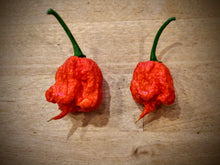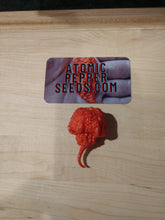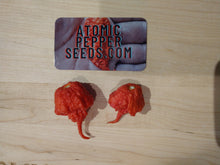The Carolina Reaper is a super-hot chili pepper with an average of 1.5 million Scoville Heat Units (SHU), known for its intense heat, fruity-sweet flavor with hints of chocolate and citrus, and its signature pointy, "scorpion-like" tail. Bred from a Ghost Pepper and Red Habanero, it was the world's hottest pepper until recently and requires caution due to its extreme capsaicin content.
Appearance & Shape
- Shape: Features a distinctive, pointed tail reminiscent of a scorpion's stinger.
- Size: Grows to about 1 to 2 inches in length and diameter.
- Skin: The skin is typically gnarled and bumpy, though some pods can have smoother skin.
- Color: The classic variety is red, but other natural color variations like orange, yellow, and chocolate also exist.
Flavor & Heat Profile
- Flavor: Beyond the extreme heat, it has a surprisingly sweet and fruity taste with floral and chocolate notes.
- Heat: At an average of 1.569 million SHU, it is exceptionally spicy, though some pods can reach over 2.2 million SHU.
- Intensity: The heat builds intensely and lingers in the throat after consumption.
Origins & Characteristics
- Breeder: Developed by Ed Currie of the PuckerButt Pepper Company in South Carolina.
- Parentage: It is a cross between the Ghost Pepper and the Red Habanero.
- Category: It is classified as a "super-hot" pepper, a category for varieties with exceptionally high capsaicin content.
These seeds were harvested from plants grown in a controlled environment and isolation to preserve genetics.





